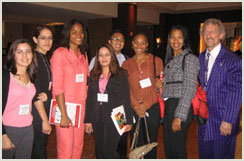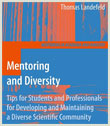
Thomas Landefeld, director, USTAR and Bridges to the Baccalaureate, joins his USTAR Scholars.
From left to right, Lissette Renteria, junior, biology, Concepcion Nunez, junior, clinical sciences, Chioma Umeh, junior, biology, Edith Ornales, junior, nursing, Mark Castanares, senior, biology, Octavia Askew, senior, biology, and LaToyia Wilson, senior, biology.
CAREER DEVELOPMENT SEMINAR PRESENTER/SPEAKER
Becoming a Scientist: Considerations for the Minority Student in Choosing a Career in Science (Undergraduates/Graduates) 1 hour seminar
There are various career options for students in the sciences. From high school to college to post-baccalaureate programs, there are many factors contributing to how one might choose a career. This presentation will open the discussion on how one might make the decision. Considerations include salary, security, pipeline issues, benefits, and other issues relating to the career choice. In addition, the discussion will include ways to effectively prepare successfully for the chosen career.
Making a Difference: When Scientists are Administrators (Faculty) 1 hour seminar
In the hierarchy of academic institutions, what impact might scientists make when they are an integral part of the university administration? Some experiences associated with bench research are invaluable towards the recruitment, retention and production of successful students, faculty and staff, and particularly make a difference when promoting the participation of those from under represented groups. How are decisions about hiring scientists for administrative positions made? What is the impact such decisions? What kind of people (personalities) chose a career in administration and why?
Minority Scientists: Where are they? Should we care? (All) 1 hour seminar
This presentation will focus on the under representation of minorities in the sciences. Discussion will include all levels, with a look at the lack of students making the successful transition to the next stage, whether it is to a 4-year institution, to graduate school or to a profession. Statistical data is discussed to demonstrate concepts that may serve to improve those numbers. Overall, the presentation is designed to provide a realistic perspective of the current status of minorities in the sciences, the reasons for this status, and actual methods to deal effectively with the problem of under representation.
Leaks in the Pipeline: Do Faculty Mend Them or Create Them? (All) 1 hour seminar
Focus is on the key role that faculty play in the pipeline of under represented minorities from precollege to professor/professional. Why are some programs more successful than others and what can be done to make those that are less successful, more productive. For those successful ones, activities and efforts are identified. Additionally, ways for successfully recruiting minority faculty are addressed.
The Effects of Minority Health Disparities Now and in the Future (All) 1 hour seminar
This seminar centers around a discussion about the issue of minority health disparities as it impacts our nation now and in the future. Importantly, the discussion deals not only with actual diseases and disorders, e.g. diabetes, uterine fibroids, asthma, etc. but also how individuals especially from disadvantaged backgrounds are affected by socioeconomics, societal racism, access to health care, environmental factors, educational disadvantages, among other issues. An important part of the discussion revolves around causes and significantly about how to address these to attain more equity.
Endocrinology: Training, careers and applications (All) 2 hour seminar
This presentation discusses aspects of the field of endocrinology from all vantage points, starting with the science of the specialty and the feedback systems that comprise it. From there, the discussion focuses on the opportunities to do basic and clinical research in a variety of applications, a major one of which is the area of minority health disparities where endocrine diseases and disorders are significantly represented, e.g. diabetes, hypertension, obesity. The type of training that is available along with the types of careers that can result from that training are highlighted.
Keys to Success for Diversity and Recruitment (All) 1 hour seminar
This seminar discusses how to plan and implement ways to successfully achieve diversity, focusing on avenues of recruitment and retention, not only at the student level but also with faculty, staff and administration. Keys include the pipeline and how to prevent and/or fix leaks to achieve success. This talk is directed to an audience that includes students, faculty and administration.
You Must Be Special (All) 1 hour seminar This seminar
discusses the need for being a specialist in whatever endeavor in which one wants to achieve. The examples provided compare being a reproductive endocrinologist and an advocate for minority issues, specifically similarities in the types of commitments and activities necessary to being successful over the long term, even to the point of comparing the endocrine organs with the individuals in academia with regard to their controlling health/disease and successful diversity efforts, respectively. This talk is applicable to individuals at all levels within the academic community.
![]() Browse Through » News & Events
Browse Through » News & Events
![]() Contact Me » tom@thomaslandefeld.com
Contact Me » tom@thomaslandefeld.com ![]()

